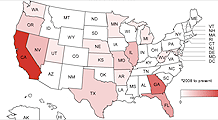55,000 helped by Obama mortgage rescue
Servicers are adjusting loans under Obama's foreclosure prevention program. The administration is expanding the program to help those that don't qualify for a modification.
NEW YORK (CNNMoney.com) -- More than 55,000 troubled homeowners have received loan modification offers under President Obama's foreclosure prevention program, officials said Thursday.
The administration also announced it was expanding the $75 billion program to assist more troubled borrowers. The government will provide incentives for servicers and borrowers to avoid foreclosure using methods such as short sales.
"These are critical steps in stemming the foreclosure crisis and stabilizing the housing market, both of which are critical to our economic recovery," said Treasury Secretary Tim Geithner.
Several servicers began processing modification applications last month. The Obama plan calls for the government to partially subsidize interest rate reductions for eligible borrowers so that their monthly payments are 31% of their pre-tax income.
Servicers have also mailed more than 300,000 letters to homeowners who might be able to get modifications, the administration said. Mortgage holders who live in their homes and have loans of no more than $729,750 originated before Jan. 1 are eligible. Also, they must be in default or at risk of default for a reason such as a significant change in income or expenses.
Only cases in which the cost of foreclosure would be higher than the cost of modification will qualify.
Chase has put more than 15,000 people into trial modifications, as of May 7, and Wells Fargo has about 3,000 borrowers in the trial period, the administration said. Homeowners must successfully make payments for three months for their modifications to be considered permanent.
Fannie Mae and Freddie Mac are receiving thousands of applications under the Obama administration plan, which allows those with Fannie Mae (FNM, Fortune 500) or Freddie Mac (FRE, Fortune 500) loans to refinance their mortgages even if they owe up to 105% of the home's value. More than 2,150 Fannie Mae loans and about 1,500 Freddie Mac loans have closed under the refinance program.
Troubled homeowners, however have complained about getting the runaround from servicers. The administration has revised the plan since it was first announced on Feb. 18, and it took weeks for financial institutions to start accepting applications.
Even now, getting a loan modified is still a challenge, said John Taylor, head of the National Community Reinvestment Coalition, whose housing counselors met with Geithner and Housing Secretary Shaun Donovan Thursday. Servicers still need to add staff and streamline the application process.
"It's easier than it was two or three months ago, but it is not easy," Taylor said.
The administration estimates the refinancing and modification plans will help up to 9 million people avoid foreclosure.
Foreclosures, however, are continuing to skyrocket, prompting concerns that it will overwhelm the administration's program. Last month, a record 342,000 homes received a foreclosure filing, according to RealtyTrac.
Looking to further dampen foreclosures, the Obama administration is seeking to make it easier for some people to get out from under the mortgage burden. Currently, many troubled homeowners find it difficult to get servicers to agree to short sales, where the servicer agrees to a sale for less than the borrower owes, or deed-in-lieu agreements, where the borrower turns over the house to the bank.
Borrowers who are eligible for modifications, but don't qualify or can't sustain payments, may find it easier to take one of these routes. Before filing for foreclosure, servicers will have to determine whether a short sale is appropriate. The property's condition and value and average time it takes to sell homes in the community are among the factors. The bank could also agree to a deed-in-lieu if the property does not sell within a set period of time.
To encourage participation, the government will pay servicers up to $1,000 for each completed short sale or deed-in-lieu, and borrowers will get up to $1,500 to assist with relocation expenses. Also, Treasury will give up to $1,000 in matching payments to extinguish second mortgages.
The administration also offered more details on incentives it will provide to lenders, servicers and investors to modify loans in areas where home prices may continue to decline. Servicers may shy away from such modifications, fearing that it could be harder to sell the home in the future if the borrower defaults again.
The incentive payments will be based on declines in the average home prices in the local market, as well as the average price of a home in that market. Payments could total as much as $10 billion. ![]()


